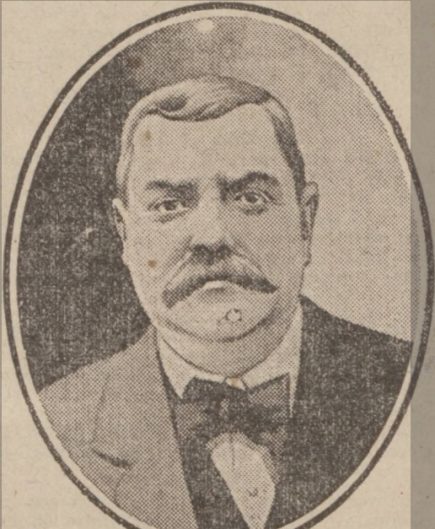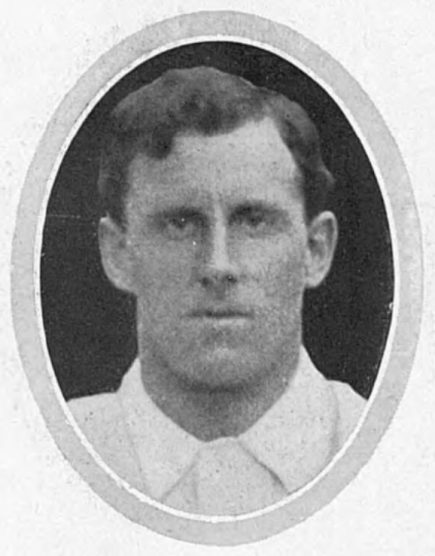May 15, 1915
Alick Raisbeck pays rare tribute to late Tom Watson.
Why the Liverpool secretary was so successful.
Unusual spectacle at International with England.
In my last contribution I left off in a gloomy atmosphere. I was referring to the scenes at the Ibrox disaster. This weeks’ begins in an even more gloomy atmosphere for me personally. I have lost one of the greatest and best friends I have met during my connection with football. And I will say this much, I shall have to look a long time and cover a lot of ground before I meet another Tom Watson.
The late Liverpool manager was more than a friend to me. From the day I became one of his players he took a particular interest in me; he fathered me, to tell the truth. The news of Tom’s death came as a great shock to me. I had not even heard that he was ill, and you can easily understand my feelings when the sad news came to hand that pleurisy and pneumonia had cut his life short.
Tom Watson (Dundee Courier: May 6, 1915):

It is difficult for me to realise that I shall never look upon his ruddy countenance again or hear that cheery voice of his, a voice which was known throughout the length and breadth of the British Isles. The Liverpool secretary had friends everywhere. People could not help liking Tom Watson, for he had a way with him of making good and lasting friends. He magnetised by his charming personality, and his unexpected death at the age of 55 will come as a great blow to a great circle of friends associated with football. And none more so than myself.
Tom was an especial favourite in Glasgow, where he was well known. Often have I heard him say he had more friends in Glasgow than anywhere else, excepting Liverpool, of course.
What Tom Watson did for Sunderland.
Words fail me to express my admiration for his qualities. They were all good ones. He was a true sportsman, and his name will not be readily forgotten. As a secretary, he has been at the top of the tree for a longer period than most men occupying a similar position. He was connected with Sunderland for a matter of ten seasons, and what a rare run of success the Roker club enjoyed while Tom Watson held the reins. Who can think of the famous “Team of all the talents” without giving some of the credit for their doings to Tom?
Sunderland F.C. (Team of all the talents):

Even before he was connected with Sunderland – when he was head of the affairs of the Newcastle West End Club – he could be depended upon to secure a player for his club where others have failed. This was because the players could not refuse him. His geniality seemed to appeal to them, and he had no difficulty whatever in urging a player to sign for the club he represented.
The triumph of Sunderland was the triumph of Tom Watson, and his judgment and knowledge of a player. Many a time, when I was playing at Sunderland for Liverpool, have I heard Wearside folk express regret that Tom Watson was allowed to leave Wearside for Merseyside. Sunderland have not done that badly since Tom left to look after the affairs of Liverpool, but I often wonder to myself what would have happened had he remained with Sunderland and enjoyed the same success that he did during his early years. It may have been that I would have been writing of my doings on Wearside for all I know.
Why Liverpool was the most attractive side.
During Tom Watson’s association with Liverpool they have experienced may vicissitudes. Though the Anfield club passed through troubled waters, he never stopped trying, and along with his directors worked hard to enable the club to secure its present magnificent ground, and prior to the war Liverpool were never in a sounder financial position. This was largely due to the fine work of Tom, who gave Liverpool the very best of his long experience of football.
During the course of his career with the Anfielders Tom saw the club champions of the First League on two occasions. They created a record by finishing on top of the Second Division one year and at the top of the First Division the following season. Liverpool experienced many ups and downs during his time, and Tom has often been heard to remark that Liverpool was the most attractive club in the League, simply because you never knew what they were going to do next.
And Tom was right, for during my stay at Anfield we lost matches which ought not to have been lost and won where we were not supposed to have the ghost of a chance of winning. That was the way of Liverpool and they have retained that liking for freak results ever since.
Tom Watson secured many wonderful players. To mention but a few – Ned Doig, the prince of goalkeepers; Donald Gow, ex-captain of Glasgow Rangers. I believe the finest and fairest back ever seen in their ranks; Hugh Wilson, John Auld, John Campbell, whom Tom thought a more effective centre-forward than John Goodall. They were the cream of talent which Tom Watson induced to throw in their lot with Sunderland, and who had not a little to do with the ultimate success of the side.
A great influence over players.
Tom was as successful in bringing good players to Liverpool. It was Tom who came and saw me play when I was on loan from the Hibernian to Stoke. Jimmy Ross, George Allan, Sam Raybould, the two Robertsons, John “Sailor” Hunter, Arthur Goddard, and a host of others were discoveries of Tom Watson. He had a great influence over all players, and it will be a difficult matter to find an adequate successor.
The high esteem in which Tom was held, not only in Liverpool, but in other football centres in the country, was strikingly evidenced by the very large attendance at his funeral at Anfield Cemetery, lying between the Everton and Liverpool grounds. Various branches of sport were represented, but particularly football, with which he was directly associated. All the leading clubs were represented, even officials from Scottish clubs came to Liverpool to see the last of the remains of Tom Watson.
What a rare tribute people from everywhere paid to him as a token of the high respect in which he was held. They respected him as the most popular man in English football. It was appropriate that old Liverpool and Sunderland players of the time of Tom Watson were pallbearers. Maurice Parry, looking well in the King’s uniform, was there, as also were Charlie Wilson, George Fleming, Arthur Goddard, Alex Robertson, trainer William Connell, Joe Hewitt, and your humble.
I shall never forget Tom Watson. How could I? Football will be all the poorer without a man of the stamp of Tom Watson.
My first dealings with Woodward.
I have departed from the beaten track this week, but I could not do other than make some reference to my old and esteemed manager’s death. To resume where I left off last week.
Season 1902-03 season was a so-so one for Liverpool. We finished fifth, although at one time it looked as if we were to carry the championship. Our liking for funny results was our undoing and we lost our grip of the flag by reason of one or two silly slips.
I was chosen to represent Scotland in her ‘National with England that year. The match took place at Sheffield. We won by the odd goal in three, but what a hard task we had. I question if Scotland ever had a harder task to beat an English side than we had that day.
Robert Templeton was in his element that day, and poor Tom Baddeley, the English goalkeeper, had something to do to keep out some of Templeton’s sledge-hammer shots.
I remember the old Wolverhampton goalkeeper remarked to me after the game that he didn’t think Templeton could shoot so hard. It happened to be one of Bobby’s “on days,” and those of you who know Templeton will readily understand what the English goalkeeper’s feelings were during the game.
This was the first time I had been in the opposition of the great Vivian Woodward. I had never seen him play before, and therefore did not know much about his methods except what I had been told. And we cannot believe all we hear. I had not long to wait ere I found out that most of what had been said about the great amateur was true. He gave me some running about, I tell you. It was not until the game had been in progress about half an hour that I tumbled to Woodward’s dodges, and played him at his own game. And with no little success. At the finish, I believe we were able to cry “quits.”
Vivian Woodward (Illustrated Sporting and Dramatic News: October 4, 1921):

Unusual spectacle at International.
England scored first, and might have won but for her outside right, Henry Davis, of The Wednesday, coming too close to my old friend (Square”) Watson, better known as Jimmy. This was in the first half. Although Davies returned in the second moiety, England was never in the picture. It was Scotland’s game, and for a time she did everything but score. Goals were long in coming, but we managed to get two past Tom Baddeley before the finish.
A very unusual spectacle to my mind that day was the appearance of Captain Christie in kilts on the line for Scotland. He cut a fine figure, and the Englishmen were very much taken up with his appearance.
Prior to the big International I played against Wales at Cardiff, This was the first occasion on which Anglo-Scots were included in a Scottish side against Wales. It was a tremendously fast game, and I thought we were just a trifle lucky to win by the odds goal. Wales has seldom put up such a rare fight against Scotland. The Welsh forwards, especially Billy Meredith, gave our defence something to do, but Andy McCombie and Jimmy Watson didn’t fail Scotland that day. I believe this was the finest pair of backs who donned a Scottish jersey.
Billy Meredith (Illustrated Sporting and Dramatic News: October 4, 1921):

(Source: The Weekly News: May 15, 1915)
XX

